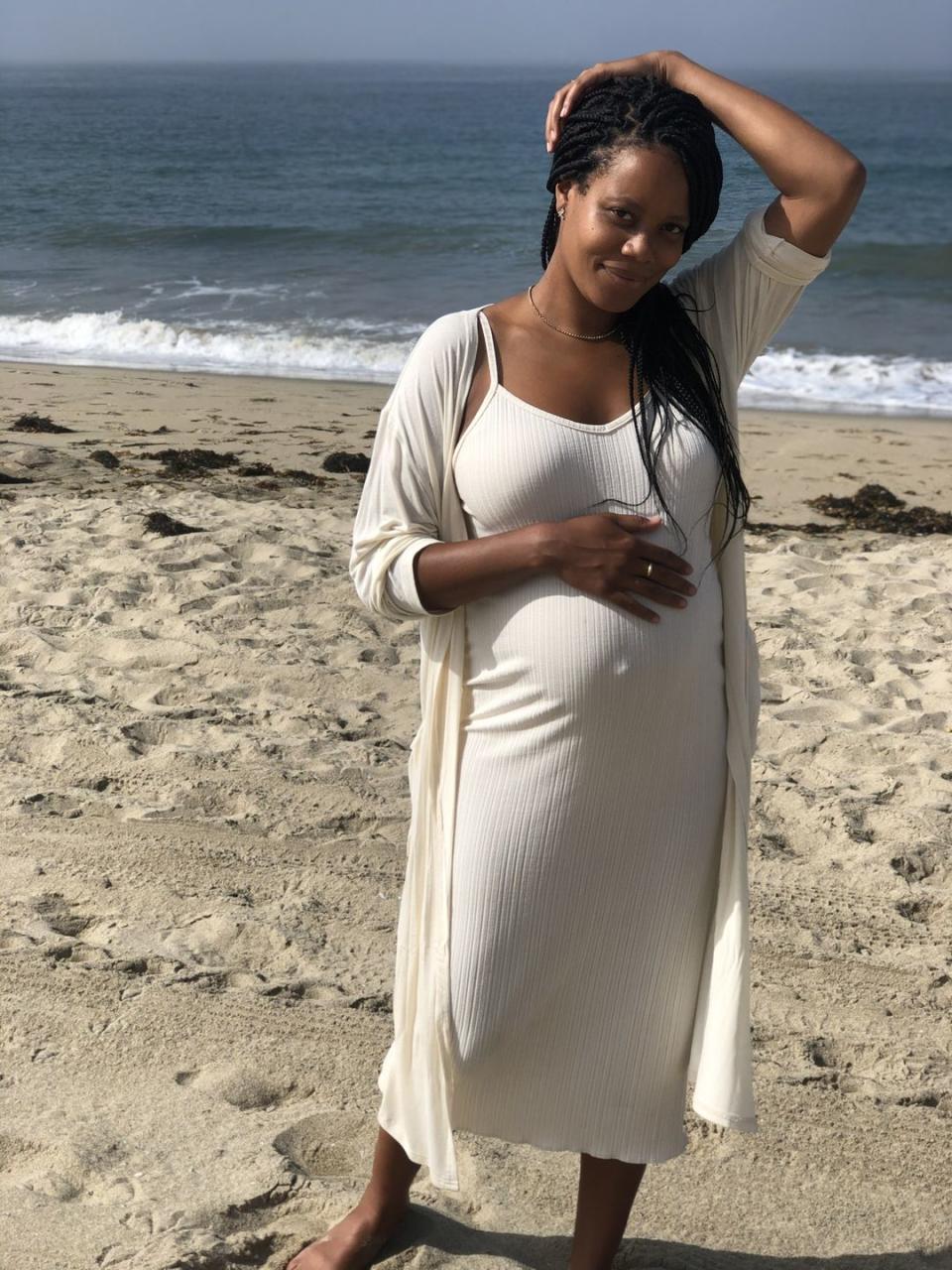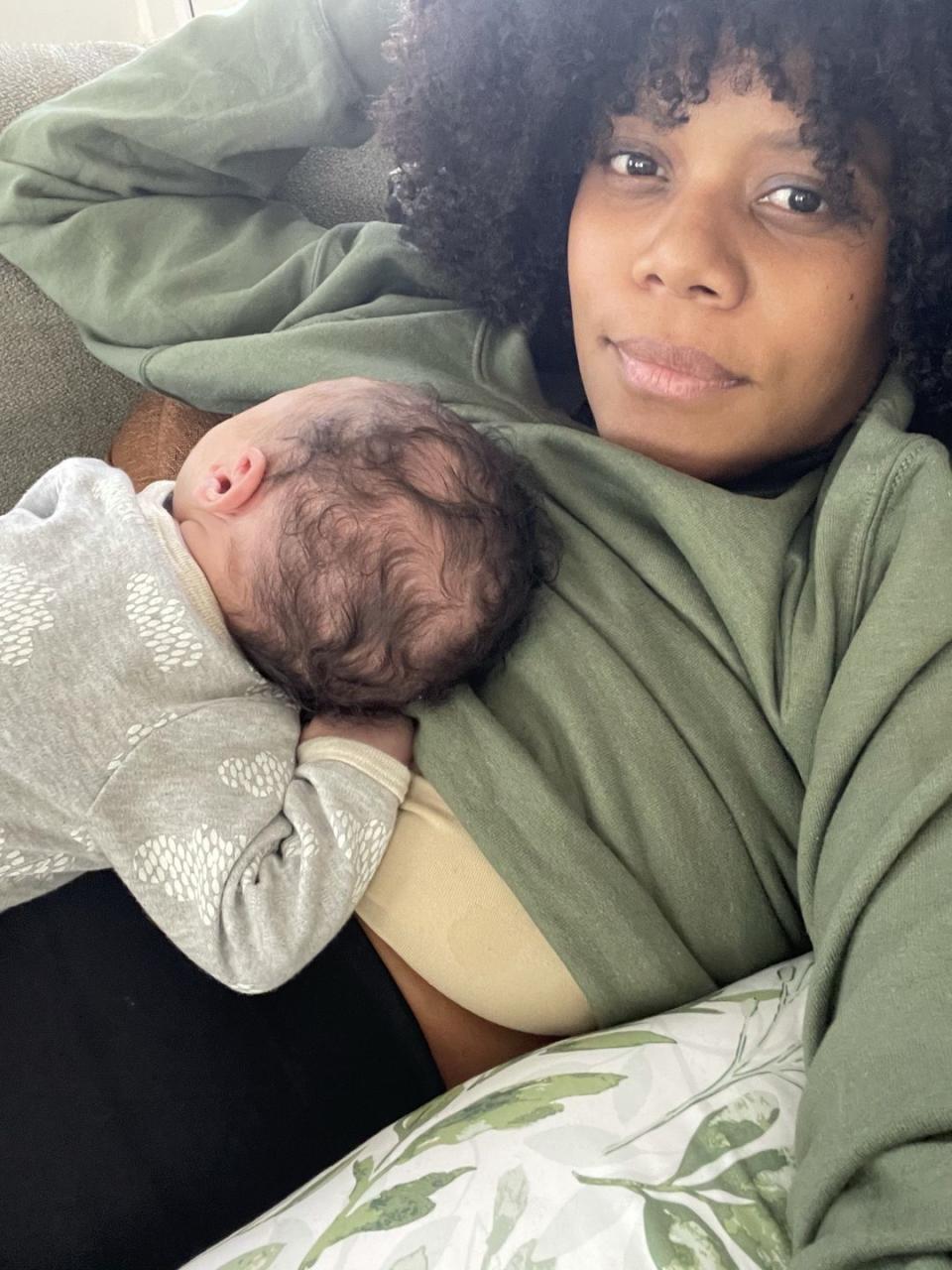'Insecure' Star Christina Elmore: 'Why I Chose An All-Black Birthing Team'

Insecure star Christina Elmore, 34, gave birth to her second son in January 2021 in Los Angeles.
I delivered my first son four and a half years ago at a birthing center in Los Angeles that specialized in helping moms achieve unmedicated births. I received wonderful care with an all-white midwifery team. Even though my labor was rough—I didn’t dilate for 27 hours—the overall experience was empowering.
When I became pregnant with my second son in 2020, I initially thought I would go back to the same center. But this time, my life—and the world—looked different. There was a global pandemic happening, and the killing of George Floyd had changed things.
I thought a lot about how I wanted this birth to be different. I didn't want to fall back on the same decisions just because it's what I did with my first child. I tried to think of this new life as being all his own. How was he going to come into a world that was at the height of the racial reckoning in this country?
I found out that I was pregnant on the day that George Floyd died.
And it was a weird feeling. I was mourning and rejoicing at the same time. It was a really hard time to be Black in America. I would choose to be Black every time, but it was hard to see that this country wasn’t made for us. I was bringing another Black life in this country, and I wanted the experience to be different for him. I wanted him to be caught by Black hands that would be able to give me the care I deserved.
As a woman of color, I’m also well aware of the data from the Centers for Disease Control and Prevention that shows Black women are three times more likely to die from a pregnancy-related cause than white women.
I wanted to feel like my worries and my pain would be heard and that I wouldn’t have to be translating while talking about fibroids, which I and many Black women have, or my fear of a C-section because of keloid scars, which people with darker skin are more susceptible to developing. Keloid scars aren't necessarily dangerous, but they can be uncomfortable and restrict movement in the area.

I know that not everyone can have an out-of-hospital birth and that there are risks associated with home births. I feel fortunate that I was able to do it twice.
I knew that I wanted to have an all-Black midwife team this time around.
Even though I had amazing care before, I just thought it would be so powerful to make a change.
It was hard to find the team I was looking for, but I ended up tracking down a wonderful duo in Allegra Hill and Kimberly Durdin of Kindred Space Los Angeles.
I quickly noticed a difference in my care. Toward the end of my pregnancy, I started having some hypertension. It wasn’t quite preeclampsia, a pregnancy complication that’s characterized by high blood pressure and signs of damage to other organ systems, but there was concern that I would have to transfer to hospital care if things got worse.
So, my midwives jumped into action. They came over to my house every morning and evening to check my blood pressure. They also started connecting me to other Black providers, including an acupuncturist who was able to do cupping to help calm me and bring my blood pressure down a little.
There was such a difference in my holistic care. This was a group of women who just heard me. I didn’t expect to have that in the medical field—it felt so unique and special.
My actual birth experience was different, too. My care team looked like me.
Both of my midwives were there, and I had a wonderful Black birth photographer, along with my lovely husband, who is white. I felt so supported. Labor is hard for everyone, but I knew that I could focus on that and they would be attuned to my needs. I was lucky that my first birth had that, too. But this time, I was looking across a room that resembled me. These women looked like my mom and my aunties. I felt safe.

I want Black women to know that our bodies were made to do this, despite the fact that we have a much higher mortality rate and weathering issues in our cells as a result of racism. ("Weathering," in case you're not familiar with it, is the theory that the stress of racism can impact the health of Black people.) You can choose to give birth in any way you want, whether that means going to a hospital or a birthing center, like I did.
There is no "right" way to give birth. If your risk factors for a complicated labor are low, you might choose an out-of-hospital birth or a home birth. But out-of-hospital deliveries tend to cost more in our country because of insurance issues, and that makes them less accessible to many women.
My biggest worry was going to a hospital and not even knowing who would be delivering me. That, for me, brought a lot of fear. If you're concerned about that, you can consider hiring a doula to advocate for you when you give birth. If you have the option, I encourage you to explore it.
I want women to understand that we have options around birth. There’s no wrong way. I hope that other women are able to feel empowered as possible, and listened to and valued as I did. Because we all deserve that.
You Might Also Like

